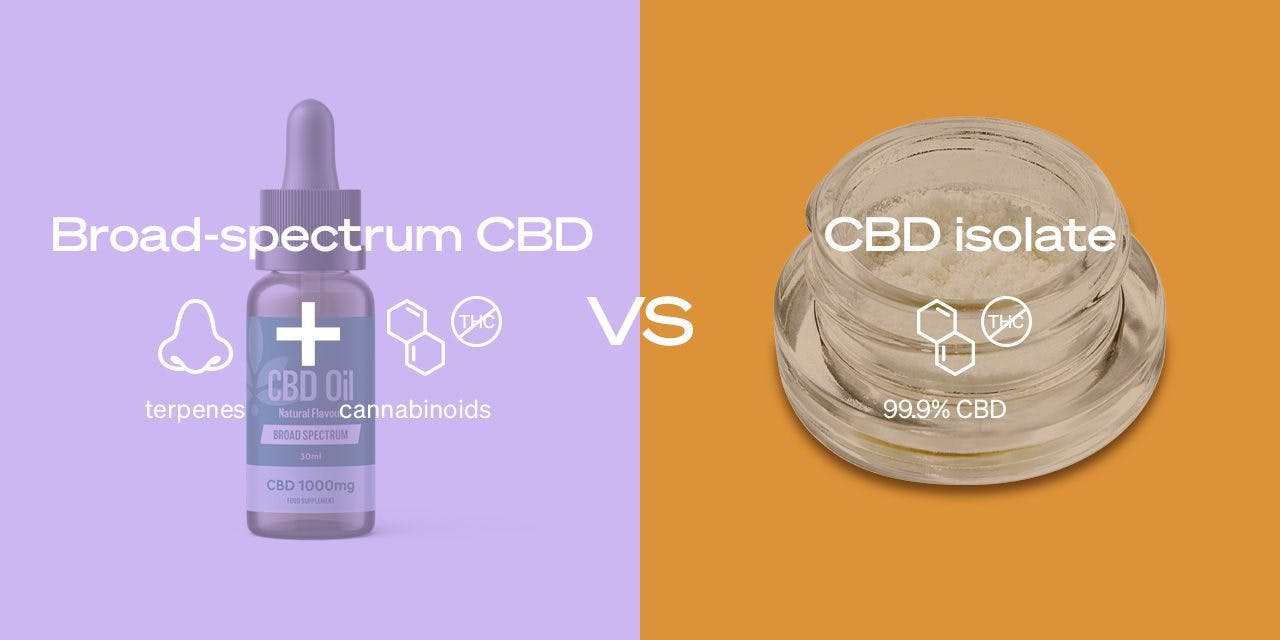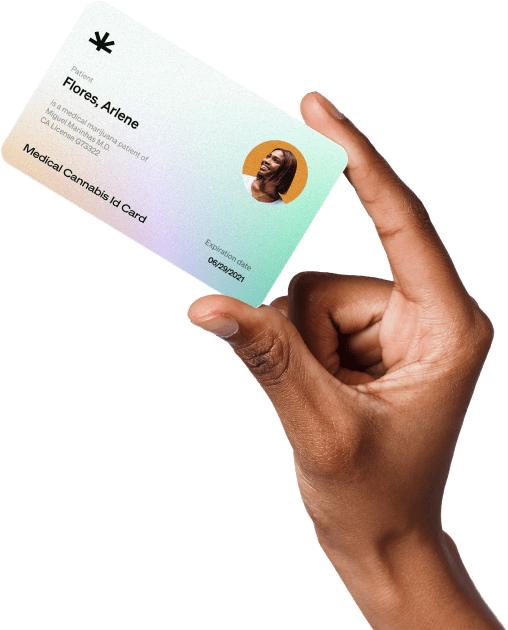What’s the Difference Between Broad Spectrum CBD and CBD Isolate?

Article written by
Emma Stone
Content reviewed by

Dr. Lewis JasseyMedical Director - Pediatric Medicine
Broad-spectrum CBD and CBD isolate represent two of the three main types of CBD extract (the other type is full-spectrum CBD).
The main difference between broad-spectrum CBD and CBD isolate is that broad-spectrum contains CBD in addition to minor cannabinoids, terpenes, and flavonoids, but no THC. Isolate, on the other hand, has only purified CBD. There are also notable differences in how these two types of extract smell, taste, and interact with the body’s endocannabinoid system.
So, which type is best for you? That depends. Let’s learn a bit more about both and when one may be better than the other at addressing your specific needs.
Get Your Medical Card
Connect with a licensed physician online in minutes.
What Is Broad-Spectrum CBD?
Broad-spectrum CBD extract contains terpenes, flavonoids, and minor cannabinoids. It does not, however, have any THC because it’s removed after the initial extraction.
Zero THC content means there is no possibility that the formulation can cause intoxication, even when consumed in high doses. It can be helpful to think of broad-spectrum CBD as representing a middle point between full-spectrum CBD and CBD isolate.
Full-spectrum CBD oil contains all the compounds present in cannabis, while isolate contains only purified CBD. Broad-spectrum CBD oil has many compounds in cannabis but does not contain THC.
How It Works
Broad-spectrum CBD products work by harnessing the benefits of CBD, minor cannabinoids, terpenes, and other phytocompounds in the cannabis plant.
There is a unique synergy that occurs when these compounds are consumed together: a phenomenon referred to as the entourage effect. THC, present in full-spectrum products, has been identified as a significant player in the entourage effect.
Some research suggests that minor cannabinoids and terpenes may contribute to this synergy. And other cannabinoids that may be present in broad-spectrum extract, such as cannabigerol (CBG) or cannabinol (CBN), have also been associated with therapeutic benefits. How these compounds interact with the body’s endocannabinoid system and other bodily systems may positively affect mood or the perception of pain.
Uses
Broad-spectrum CBD extract can be used in formulations, such as CBD oil, to help treat conditions such as anxiety, stress, seizures, pain, inflammation, and insomnia. Individuals tend to opt for broad-spectrum CBD when they want to experience the benefits of full-spectrum CBD products without the presence of any THC. Broad-spectrum CBD is, therefore, ideal for athletes or others who may be subjected to random drug tests at work.
Potential Benefits
Individuals who use broad-spectrum CBD products can harness the effects of CBD and other phytocompounds in the extract. Clinical research on epilepsy, for example, suggests that CBD formulations that contain a spectrum of other cannabinoids and terpenes boast enhanced effects and require a smaller dose than CBD isolate products.
Risks and Drawbacks
One of the significant drawbacks of broad-spectrum CBD extract is that some individuals find the flavor unpalatable. Broad-spectrum extracts can have a strong, grassy flavor due to cannabinoids, terpenes, and other plant compounds. This may deter some individuals from using the extract regularly, which could diminish the therapeutic benefits of consistent use.
What Is CBD Isolate?
CBD isolate is a form of CBD extract available in a crystalline state or as a powder. Isolate is created by extracting all active compounds from raw plant material, then further refining the hemp extract by removing all other compounds such as minor cannabinoids, THC, terpenes, and any residual waxes or lipids. This refinement process produces CBD in its purest form, free of any distinctive odor or taste.
How It Works
CBD isolate contains only CBD, so there are no other compounds to account for, making it easier to dose and predict its effects. Pure CBD doesn’t directly bind to the body’s cannabinoid receptors like some other cannabinoids (like THC) do.
Instead, CBD is believed to work in several ways. CBD is non-intoxicating, so it will not make you “high,” but it does confer mild psychoactive effects on the user that are commonly experienced as a change in mood.
The cannabinoid can prevent the body’s endogenous cannabinoids (endocannabinoids) from breaking down, allowing the body’s endocannabinoids to circulate within the system for longer and impart more beneficial effects. CBD can also influence the body’s serotonin receptors (which play a role in mood) and pain receptors and even impact the body’s immune system.
Uses
CBD is ideal for those seeking a standardized, consistent dose of CBD and predictable effects every time. CBD isolate also represents a more neutral canvas concerning taste and odor. Isolate extract can be blended with other essential oils or flavors to create palatable, creative CBD products that taste good and smell appealing.
Potential Benefits
One of the major benefits of CBD isolate is its versatility. Powders and crystals can be easily added to a range of CBD products, including food, beverages, topicals, sublingual products, and more.
Another benefit of isolates is that they undergo intensive purification — isolates are usually at least 99% pure, and this purification effectively refines any unwanted residues from the extract.
Risks and Drawbacks
CBD isolate can be characterized by one major drawback: it cannot harness the potential benefits of the entourage effect. When CBD is consumed or used in conjunction with other beneficial phytocompounds present in cannabis, a synergistic interaction — the entourage effect — can be produced. By stripping other cannabinoids, terpenes, and flavonoids from the extract, there is no possibility of the entourage effect.
Similarities and Differences Between Broad-Spectrum CBD and CBD Isolate
Broad-spectrum CBD and CBD isolate share some noteworthy similarities:
- Both are extracts from the hemp or cannabis plant and are free from THC.
- Both extracts undergo a solvent or non-solvent based (like C02) extraction process to separate the active chemical compounds from unwanted raw plant material.
However, there are also some notable differences:
- Isolate CBD is ultra-purified, so it must undergo multiple refinement cycles to remove all other compounds in the hemp or cannabis plant. Broad-spectrum CBD, on the other hand, only undergoes the initial extraction and the removal of THC.
- CBD isolate contains purified CBD, so it is easier to standardize dosage and predict its effects on the body. Conversely, broad-spectrum CBD includes a symphony of minor cannabinoids, terpenes, and flavonoids, so it interacts with the body’s systems in diverse ways.
How to Decide Which Is Best For You
Choosing CBD isolate or broad-spectrum CBD is a personal decision that your individual needs and preferences will likely influence.
When to Use Broad-Spectrum CBD
Broad-spectrum CBD is ideal for those seeking a whole-plant CBD experience that contains 0% THC. Individuals who wish to harness some of the benefits of the entourage effect may benefit from the range of minor cannabinoids, terpenes, and flavonoids present in broad-spectrum formulations.
Broad-spectrum CBD products, like broad-spectrum CBD oil or tinctures, are also often favored by individuals who prefer to consume CBD that hasn’t been ultra-refined or purified.
When to Use CBD Isolate
CBD isolate can be helpful for those seeking to harness the effects of pure CBD without the complicating presence of any other minor cannabinoids or phytocompounds. Isolate products are also ideal for individuals who wish to avoid THC entirely, particularly those who may be subjected to random drug tests. CBD isolate is also easier to accurately dose, so it may appeal to individuals who require precise dosing.
The Bottom Line
Broad-spectrum CBD and CBD isolate two forms of CBD extract that contain 0 THC. However, broad-spectrum CBD contains a wide variety of other compounds, such as minor cannabinoids or terpenes, while CBD isolate is 99% purified and contains only CBD.
Get Your Medical Card
Connect with a licensed physician online in minutes.
Frequently Asked Questions
Which is better: Isolate or broad-spectrum CBD?
Each product boasts advantages and disadvantages. Isolate may be better for CBD users seeking a purified product that can be accurately dosed and delivers predictable effects. Those who wish to harness the benefits of the other compounds present in cannabis and hemp plants may prefer broad-spectrum CBD products.
What is broad-spectrum CBD best for?
Broad-spectrum CBD is best for people who prefer to consume CBD products that haven’t been stripped of the other beneficial compounds present in the cannabis plant. Broad-spectrum products are also ideal for those who wish to enjoy the benefits of the wide range of terpenes, cannabinoids, and flavonoids present in the plant without the intoxicating effects of THC. Those seeking to harness the full cannabinoid spectrum would best opt for full-spectrum CBD.
